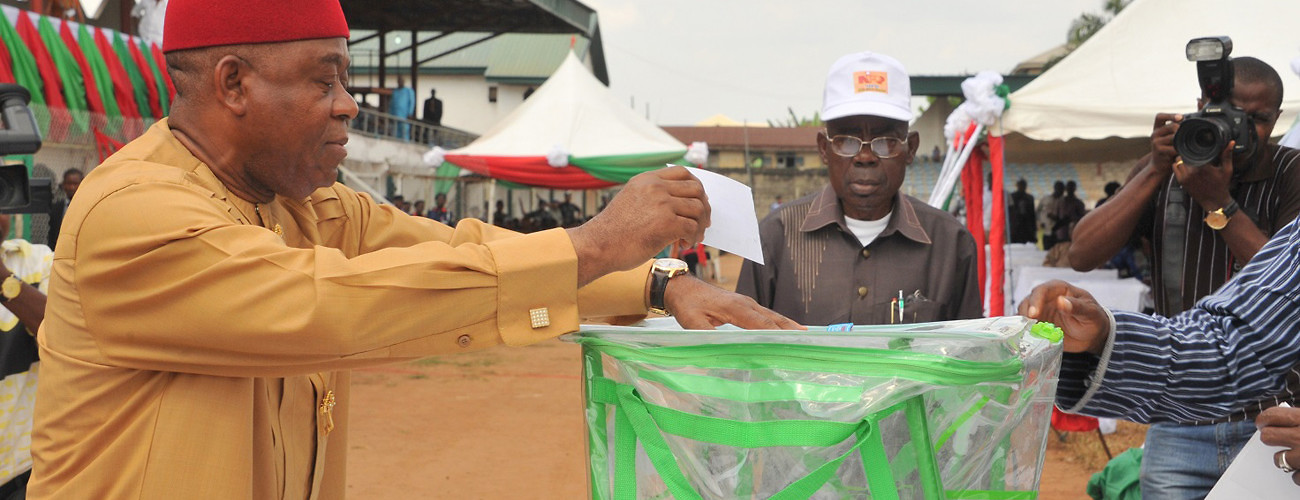Elections in Nigeria (Flickr/Heinrich-Böll-Stiftung)
On February 7, Nigeria’s Independent National Electoral Commission (INEC) confirmed the country’s forthcoming general elections would be postponed by six weeks. Initially scheduled for February 14, voting will now take place on March 28, with INEC identifying security threats associated with the Boko Haram insurgency as the primary motivation. According to the head of INEC, Professor Attahiru Muhammadu Jega, the voting period was set to coincide with a major counterinsurgency operation against Boko Haram, which would have diverted military assets otherwise required to ensure the election passed peacefully. A secondary motivation was that the delay would give the Nigerian military and its regional allies the opportunity to score a decisive victory against the extremist sect prior to the elections.
The delay met with mixed reactions in Nigeria. Those in favor of the postponement argued it was necessary to ensure the Boko Haram threat was nullified before any voting could take place. Those against the decision claimed it was politically motivated and an attempt by incumbent Nigerian President Goodluck Jonathan to stymie the momentum of his chief opponent Muhammadu Buhari. Worryingly, these dissenting voices also questioned the independence and impartiality of INEC itself, raising concerns about whether the election process will be viewed as free and fair when eventually held. Political motivations aside, will six weeks be enough time for Nigeria and its regional allies to defeat Boko Haram and bring a degree of stability to Nigeria’s embattled northeast? Looking at the available evidence, it is hard to believe so.
Firstly, the Nigerian army is suggesting it will accomplish in six weeks what it has failed to achieve in six years. In this time, Boko Haram has transformed from a ragtag collection of Islamist proselytizers into a heavily armed militant force, which the United States estimates to be 6,000-strong. It is estimated Boko Haram controls as many as 20 of 27 local government areas in Nigeria’s northeastern Borno State, in addition to two each in the neighboring states of Adamawa and Yobe. In total, an area the size of Belgium may have fallen under Boko Haram’s brutal control. Given Nigeria’s lackluster response to the insurgency, reclaiming such a vast swathe of territory in such a short space of time seems improbable at best.
Having said that, in the past few days there has been some hope that the tide may already be turning. Nigeria and its neighbors have now formalized a counterterrorism pact that will have a more regional and multilateral flavor. It already appears to be yielding dividends: On February 3, forces from Chad confirmed they had recaptured Gamboru, seized by Boko Haram in August 2014, after advancing on the border town from neighboring Cameroon a day earlier. At the time of writing, joint military operations were also targeting Boko Haram positions in and around the Borno localities of Baga, Dikwa, Malam Fatori, Damasak, Ngala, and Bama.
While we should of course cheer this positive development, it remains unlikely that future multilateral military ventures will continue to produce such instantaneous results. As well as Boko Haram’s noted fortitude, joint operations against the sect face myriad operational and logistical challenges. For one, regional and domestic power dynamics could pose an obstacle to the unfettered cooperation on which success depends. Nigeria’s ruling People’s Democratic Party is already under domestic pressure due to the presence of foreign forces on its soil, with Buhari, a former military leader, describing it as a “disgrace.” With the election looming, the government is no doubt keen to counter such accusations by dictating the rules of engagement and asserting its primacy in any definitive victories scored against Boko Haram. Such posturing may not, however, be welcomed by the country’s alliance partners, who may themselves want to claim any victories.
From a wider geopolitical perspective, decades-old territorial disputes between Nigeria and its neighbors, particularly over ownership of the resource-rich Lake Chad, could also foster mutual distrust that could compromise cooperation. Unanswered questions regarding the financing, logistics, and coordination of the multilateral force might also threaten its efficacy.
Even if the combined forces are successful in dislodging Boko Haram from its regional strongholds, this may not bring about immediate stability. It is worth noting that the group’s recent strategy of capturing and holding territory is a novel development in its decade-long insurgency. Prior to July 2014, when it seized its first town, the sect effectively operated as a guerrilla force waging an urban terror campaign that spread as far west as the city of Sokoto and as far south as the capital, Abuja. During this time, suicide and car bombings, targeted assassinations, kidnappings, armed ambushes, and coordinated raids became a near daily occurrence across parts of Nigeria.
Boko Haram could well revert to this dispersed urban terror campaign should it be routed in its current strongholds. Counter to the recent INEC decision, such a scenario could ultimately see it pose a more acute threat to Nigeria’s elections, by activating terrorist cells believed to be embedded in major cities where millions would be casting their ballots. The Nigerian government could try to address this threat by launching simultaneous security operations in both rural and urban environs, but such an undertaking would be both resource-intensive and time-consuming.
In summary, it seems highly unlikely that Nigeria will be able to nullify the Boko Haram threat by the time of the rescheduled ballot. On the contrary, efforts by the country’s military and its alliance partners to counter the sect could create a security climate less conducive to the holding of elections. The next concern is what INEC’s response will be should the Nigerian military not meet its stated aims, as seems likely. By postponing elections due to security concerns, the electoral commission has now set a precedent. If there is no improvement in the security situation, it may be forced to delay the vote again, fermenting the security crisis that it so desperately seeks to avoid.





